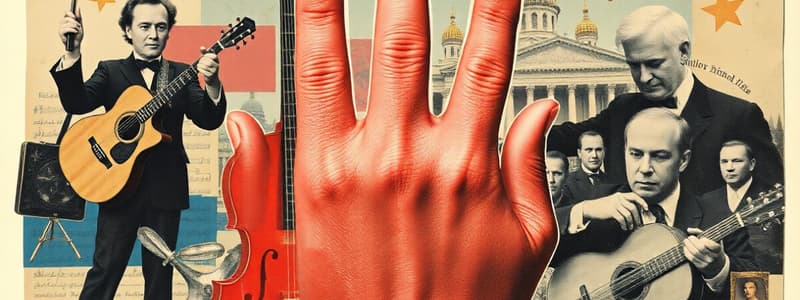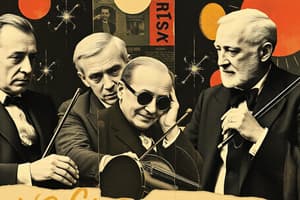Podcast
Questions and Answers
Which of the following best explains why the 'Mighty Handful' sought to create a distinctly Russian musical identity?
Which of the following best explains why the 'Mighty Handful' sought to create a distinctly Russian musical identity?
- They aimed to gain international recognition by developing musical techniques superior to those used in Western Europe.
- They were commissioned by the Russian government to promote cultural exchange with Western countries through unique musical compositions.
- They believed that Russian folk music was inherently more complex and sophisticated than Western classical music.
- They wanted to distance themselves from Western musical styles in response to a surge of nationalist feeling in Russia. (correct)
How did Mily Balakirev directly contribute to the development of Russian music beyond his role as a composer?
How did Mily Balakirev directly contribute to the development of Russian music beyond his role as a composer?
- By establishing a publishing house dedicated to distributing scores of Russian composers throughout Europe.
- By founding St. Petersburg's Free School of Music, fostering a learning environment focused on Russian musical identity. (correct)
- By writing a series of influential essays that outlined the theoretical foundations of Russian national music.
- By funding musical education for underprivileged children, ensuring future generations had access to training.
How did the personal lives and professions of Borodin and Mussorgsky influence their musical contributions to the 'Mighty Handful'?
How did the personal lives and professions of Borodin and Mussorgsky influence their musical contributions to the 'Mighty Handful'?
- Their lack of formal musical training allowed them to disregard traditional Western musical conventions, resulting in more innovative and experimental compositions.
- Their scientific and military backgrounds provided a disciplined approach to composition, resulting in highly structured and mathematically precise musical works.
- Their political connections and social status provided them with access to patronage and performance opportunities, enabling them to promote their music more effectively.
- Their demanding careers limited their compositional output, leading them to focus on quality over quantity and to deeply explore a few select Russian themes. (correct)
In what key way did Rimsky-Korsakov's approach to Russian national music differ from that of the other members of the 'Mighty Handful'?
In what key way did Rimsky-Korsakov's approach to Russian national music differ from that of the other members of the 'Mighty Handful'?
What was the primary significance of Mikhail Glinka's influence on the 'Mighty Handful'?
What was the primary significance of Mikhail Glinka's influence on the 'Mighty Handful'?
Considering the collaborative nature of the 'Mighty Handful,' what might be a lasting impact of their approach on subsequent generations of composers?
Considering the collaborative nature of the 'Mighty Handful,' what might be a lasting impact of their approach on subsequent generations of composers?
How does The Flight of the Bumblebee from Rimsky-Korsakov's The Tale of Tsar Saltan exemplify the composer's broader artistic approach?
How does The Flight of the Bumblebee from Rimsky-Korsakov's The Tale of Tsar Saltan exemplify the composer's broader artistic approach?
Why might Borodin have spent 18 years working on his opera Prince Igor, which was ultimately finished by Rimsky-Korsakov?
Why might Borodin have spent 18 years working on his opera Prince Igor, which was ultimately finished by Rimsky-Korsakov?
What potential challenges might the 'Mighty Handful' have faced due to their strong emphasis on creating a uniquely Russian musical style?
What potential challenges might the 'Mighty Handful' have faced due to their strong emphasis on creating a uniquely Russian musical style?
How did Balakirev's travels in the Caucasus influence the music of the Mighty Handful?
How did Balakirev's travels in the Caucasus influence the music of the Mighty Handful?
Flashcards
The Mighty Handful
The Mighty Handful
A group of five Russian composers who aimed to create a distinctly Russian musical identity in the 19th century.
Mily Balakirev
Mily Balakirev
The leader of the Mighty Handful, who encouraged other composers but struggled to complete his own works.
Alexander Borodin
Alexander Borodin
A chemist by profession who composed romantic music in his free time and a member of the Mighty Handful.
César Cui
César Cui
Signup and view all the flashcards
Modest Mussorgsky
Modest Mussorgsky
Signup and view all the flashcards
Nikolai Rimsky-Korsakov
Nikolai Rimsky-Korsakov
Signup and view all the flashcards
Mikhail Glinka
Mikhail Glinka
Signup and view all the flashcards
The Tale of Tsar Saltan
The Tale of Tsar Saltan
Signup and view all the flashcards
Prince Igor
Prince Igor
Signup and view all the flashcards
Flight of the Bumblebee
Flight of the Bumblebee
Signup and view all the flashcards
Study Notes
- In the 19th century, a surge of nationalist feeling swept across Russia.
- Russian artists and composers shifted from mimicking Western styles to creating their own sense of identity.
- "The Mighty Handful" was a group of five composers passionate about developing distinctly Russian music.
The Mighty Five
- The "Mighty Handful" aimed to develop a uniquely Russian musical identity.
- They collaborated on music, performed new compositions, discussed ideas, and suggested alterations to each other's scores.
Musicians of the Mighty Five
- Mily Balakirev (1837-1910) was the group's leader who encouraged the other composers, but struggled to finish his own compositions.
- Alexander Borodin (1833-1887) was a chemist who composed music on weekends, known as the most romantic member of the group, famous for his lively choral music.
- Modest Mussorgsky (1839-1881) lived a chaotic life and drank heavily; his music is earthier than that of the other members.
- César Cui (1835-1918) composed operas and children's songs; his music was inspired by Russian folktales, incorporating elements of Russian folk music.
- Nikolai Rimsky-Korsakov (1844-1908) used folk melodies and Russian themes, as well as understanding and using Western styles of music.
Musicians' Influences
- Mikhail Glinka (1804-1857), "Father of Russian Music," encouraged a return to the real music of Russia.
Russian Traditions
- The "Mighty Handful" drew inspiration from Russian legends, stories, songs, and folk dances.
Historical Context
- 1855: Mily Balakirev moved to St. Petersburg where he met and was inspired by Mikhail Glinka.
- 1856: Balakirev befriended César Cui and Modest Mussorgsky, who were both enrolled in the Russian army; he persuaded them to dedicate more time to their music.
- 1857: After Glinka's death, Balakirev championed Russian music.
- 1858: Mussorgsky left his army career to pursue his increasing interest in music.
- 1861: Balakirev and Nikolai Rimsky-Korsakov met combining a career in the navy with his music.
- 1862: Balakirev met Alexander Borodin. Borodin and Rimsky-Korsakov began composing their first symphonies. Balakirev, aged 25, founded St. Petersburg's Free School of Music and spent his summers traveling around the Caucasus, gaining inspiration from folk music.
- 1863: Balakirev encouraged Borodin to dedicate more time to music.
- Late 1860s: The group began to disagree and drift apart, moving away from Balakirev's increasingly demanding influence.
Notable Works
- Mussorgsky's Night on Bald Mountain: Russian folk group dance featuring witches and demons gathering for the black Sabbath with wild cries and eerie, unsettling sounds.
- Rimsky-Korsakov's Tale of Tsar Saltan: a magical story of romance and deception following Prince Gvidon, marooned on an island as a child which features the Flight of the Bumblebee, Rimsky-Korsakov's most famous work.
- The Flight of the Bumblebee from Act III of The Tale of Tsar Saltan is played when the Swan-Bird changed the Tsar's son into an insect so that he can fly to his father.
- Borodin's Prince Igor: tells the story of a Russian prince captured by the Polovetsians featuring the Polovetsian dances full of energetic leaps and whirls (completed by Rimsky-Korsakov after Borodin spent 18 years on it).
Studying That Suits You
Use AI to generate personalized quizzes and flashcards to suit your learning preferences.




